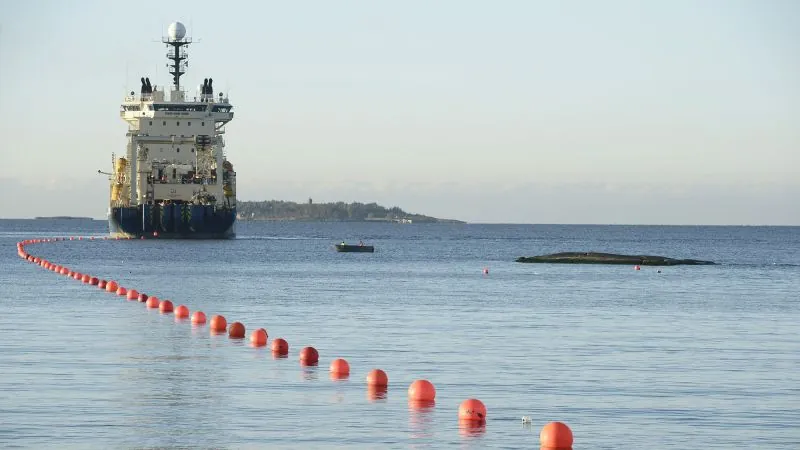
Accident or Sabotage? Tensions Rise as Baltic Sea Cables Severed Amidst Geopolitical Concerns
2024-11-20
Author: Yan
A Perplexing Incident in the Baltic Sea
A perplexing incident has unfolded in the Baltic Sea, where two significant undersea internet cables were severed within a span of just 48 hours, raising eyebrows and igniting a fierce debate among investigators and officials in both Europe and the United States.
The Affected Cables
The affected cables—BCS East-West, connecting Lithuania and Sweden, and C-Lion1, linking Finland with Germany—suffered disruptions on a Sunday and a Monday. The abrupt nature and timing of these incidents have led European officials to suspect a deliberate act of sabotage, while American counterparts lean towards the possibility of an unfortunate accident.
Reactions from Officials
Germany’s Defense Minister, Boris Pistorius, expressed his disbelief regarding the notion of an accidental severance, framing it as an event that stirs significant concern and suggesting a more sinister motive at play. Finnish and German foreign ministers echoed these sentiments in a joint statement, cautioning that the incident could be indicative of "hybrid warfare," with a clear implication of Russian involvement.
Suspicion of Russian Involvement
This suspicion is not unfounded. In recent months, Russia has been suspected of orchestrating hybrid warfare tactics across Europe, characterized by a myriad of troubling events, including suspicious arsons and explosions. Compounding these worries is a prior warning from the U.S., suggesting that Moscow may be planning strikes on critical undersea infrastructure, following troubling observations of Russian naval movements in European waters.
Contrasting U.S. Insights
Nonetheless, two U.S. officials who shared insights with CNN believe that the damage is likely the result of an anchor drag from a nearby vessel—a phenomenon not entirely unheard of, but rare in the context of such simultaneous incidents.
Kremlin's Dismissal
In response to the mounting allegations, the Kremlin dismissed claims of Russian responsibility as “laughable,” insisting it is unjust to continuously point fingers without substantive evidence.
Investigation Initiatives
Contrasting this, law enforcement agencies in Sweden and Finland are taking a different stance. The Swedish Prosecuting Administration has initiated a preliminary investigation into the potential for sabotage, while the Finnish National Bureau of Investigation has launched a significant probe focused on criminal mischief and interference with communications.
The Chinese Connection
Adding intrigue to the situation, authorities are particularly focused on the Chinese-flagged bulk carrier Yi Peng 3, which was spotted near the locations where the cables were severed. This vessel had recently docked at the Russian port of Ust-Luga for several days, furthering speculation about potential connections to the incident.
Danish Armed Forces' Presence
On Wednesday, the Danish Armed Forces confirmed their presence near Yi Peng 3, though it remains unclear whether they have taken specific actions against the ship. In a press briefing, a Chinese foreign ministry spokesperson claimed ignorance about the incident, asserting that China upholds its responsibilities regarding maritime regulations and emphasizes the importance of protecting vital undersea infrastructure.
Global Implications
As investigators delve deeper into the mystery, the global community watches closely, with the implications of this event resonating beyond just internet connectivity—potentially impacting diplomatic relations and security strategies across the region.
Conclusion
Stay tuned as this story develops! Will the truth behind the severed cables finally come to light, or are we on the brink of another geopolitical crisis?





 Brasil (PT)
Brasil (PT)
 Canada (EN)
Canada (EN)
 Chile (ES)
Chile (ES)
 España (ES)
España (ES)
 France (FR)
France (FR)
 Hong Kong (EN)
Hong Kong (EN)
 Italia (IT)
Italia (IT)
 日本 (JA)
日本 (JA)
 Magyarország (HU)
Magyarország (HU)
 Norge (NO)
Norge (NO)
 Polska (PL)
Polska (PL)
 Schweiz (DE)
Schweiz (DE)
 Singapore (EN)
Singapore (EN)
 Sverige (SV)
Sverige (SV)
 Suomi (FI)
Suomi (FI)
 Türkiye (TR)
Türkiye (TR)